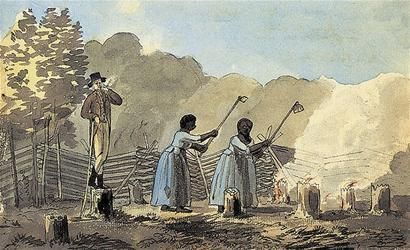Narrator: Listen to part of a conversation between a student and her United States History professor.
聽一段學生和美國歷史教授的對話。
Professor: So, Amanda, you've asked a lot of questions about trade during the colonial period of the United States. Has our discussion clarified things for you?
阿曼達,你問了很多在美國殖民時期的貿易問題。我們的討論解決了你所有疑問了嗎?
Student: Well, yeah, but now, I think writing about trade for my paper isn't going to work.
嗯,但現在我覺得,我的論文寫貿易方面的內容可能行不通。
Professor: Oh, so your questions about shipping routes were for your research paper?
噢,你關于航運路線的問題是為你的研究論文做準備的?
Student: Yeah. But now, I see that I probably need to come up with a new paper topic.
對,但現在我看我大概要想個新主題了。
Actually, there was one other idea I had.
事實上,我還有另外一個想法。

I have been thinking about doing something about community planning in the early British settlements in Eastern North America.
我一直想做些早期美國東北部英國定居者的社區規劃相關的研究。
Professor: Oh. OK. I am curious. Why are you interested in doing something on community planning in colonial times?
噢,好吧。我很好奇。為什么你會想做些殖民時期社區規劃的研究?
Student: Well, I am much more into architecture. It's my major and I mean, planning out a town or city goes along with that.
我對建筑更感興趣。這是我的專業,我是指,規劃城鎮或城市和我的專業更相關。
I mean, not that I don't like history...I am interested in history...really interested...
我不是指我不喜歡歷史......我對歷史也很感興趣......非常感興趣......
But I think, you know, for a career, architecture is more for me.
但我覺得,如果要作為職業,建筑更適合我。
Professor: That's great. I've gotten some very thought-provoking papers from students whose interests go beyond history.
那很棒。我有些論文,是從那些興趣不止在歷史的學生那兒得來的,這些論文都非常發人深省。
Student: OK. But for the paper you wanted us to try to include a comparison, right?
好。但在論文中,你希望我們能在內容中加入對比,對吧?
Professor: Yes. Actually, that was really the purpose of the assignment.
對。事實上這正是這項作業的目的。
The way the United States developed or perhaps I should say the colonies, since the land that would become the Eastern United States...uh...there were British colonies there four hundred years ago.
美國發展的方式,或者我該說殖民地,因為現在的美國東部所在地,在400年前正是英國殖民地。
But anyway...uh... development in the colonies differed greatly depending on geography.
但不管怎樣,這些殖民地的發展情況根據地理情況不同有很大差異。
I am looking for papers that have ideas about how something that happened one way in the Northern colonies happened a different way in the Southern colonies.
我希望能有論文寫到,為何在北方殖民地中的一些情況,換到南方殖民地就大大不同了。
Student: Is that true in terms of urban planning?
以城市規劃來說,不正是如此嗎?
Professor: Very true. Towns in the Northern colonies were centralized and compact.
對。北部殖民地的城鎮很集中,規模較小。
They provided a meeting point for exchanging goods, for participatory government, and for practicing religion.
他們有交換商品、公民參政和宗教活動的集合點。
Houses would be built along the roads that led into town.
房屋都沿著通往城鎮的路而建。
And just outside the developed area, there would usually be an open field of some sort for grazing animals and also group activities.
就在發展區外,通常會有一片開放區域,給人們放牧或進行集體活動。
Actually, the model for planning a town in the Northern colonies was not unlike the model for the development of towns in medieval Europe.
事實上,北部殖民地的城鎮規劃模式和中世紀歐洲的城鎮發展模式沒什么兩樣。
After all, the colonists had just come from Europe and the medieval period was just ended.
畢竟,殖民者都是從歐洲來的,中世紀也才剛剛結束。
Student: Medieval Europe. But what about the South?
中世紀的歐洲。那南方呢?
If I remember correctly... In the South, at least initially, they didn't build towns so much as they built trading posts.
如果我沒記錯......在南方,至少在一開始,人們建的城鎮還沒有貿易點多。
Professor: That's right. Most of the settlers in the North wanted to start a whole new life.
正確。在北方的大部分定居者都想開始新的生活。
But most of the people who came from Europe to the South just wanted to make some money and then go back.
但大部分來自歐洲最后定居南方的人,只想著賺錢然后回家。
It is not surprising that some of most common buildings were storage facilities and port facilities.
這也就不奇怪,當時一些最常見的建筑是儲存設施和港口設施。










